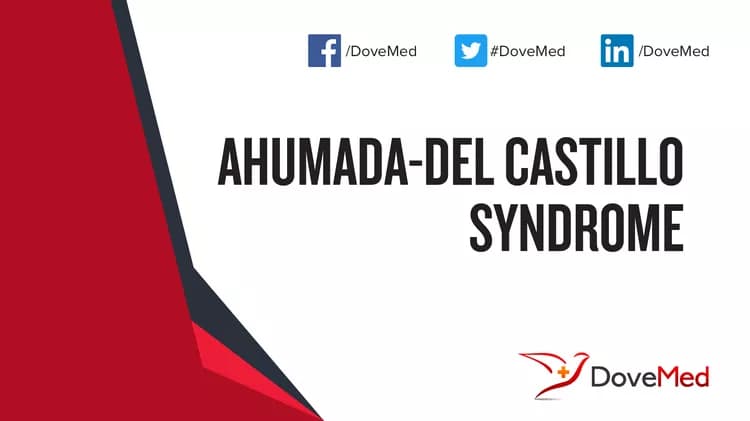
Ahumada-Del Castillo Syndrome
What are the other Names for this Condition? (Also known as/Synonyms)
- Argonz-Del Castillo Syndrome
- Argonz-Ahumada-Del Castillo Syndrome
- Nonpuerperal Galactorrhea-Amenorrhea
What is Ahumada-Del Castillo Syndrome? (Definition/Background Information)
- Ahumada-Del Castillo syndrome is an endocrine disorder that results in the lack of function of pituitary and hypothalamus glands in women.
- Typically, the syndrome causes symptoms that make it appear that the woman is pregnant even when she is not carrying a child.
Who gets Ahumada-Del Castillo Syndrome? (Age and Sex Distribution)
- Females are the only ones that are affected by Ahumada-Del Castillo syndrome.
- The syndrome most often affects adult females.
What are the Risk Factors for Ahumada-Del Castillo Syndrome? (Predisposing Factors)
Common risk factors of Ahumada-Del Castillo syndrome include:
- Tumors in the pituitary gland
- Tumors in the hypothalamus gland
- Low thyroid levels
- Chronic drug use
It is important to note that having a risk factor does not mean that one will get the condition. A risk factor increases ones chances of getting a condition compared to an individual without the risk factors. Some risk factors are more important than others.
Also, not having a risk factor does not mean that an individual will not get the condition. It is always important to discuss the effect of risk factors with your healthcare provider.
What are the Causes of Ahumada-Del Castillo Syndrome? (Etiology)
- Ahumada-Del Castillo syndrome is caused by compression of the pituitary stalk. When this occurs, the pituitary gland is unable to function properly due to its compromised state.
- This syndrome can also result from reduced dopamine levels, which often causes the body to produce abnormal levels of various chemicals that can be seen in the symptoms of the disorder.
- Ahumada-Del Castillo syndrome can also be caused by tumors in the pituitary gland or hypothalamus gland. When tumors are present in these glands, it makes it more difficult for them to function properly. If proper functioning does not occur, the body will be out of balance and result in symptoms common to the syndrome.
What are the Signs and Symptoms of Ahumada-Del Castillo Syndrome?
Common signs and symptoms of Ahumada-Del Castillo syndrome include:
- Estrogen deficiency
- Low urine excretion
- Lactation in the absence of breastfeeding (production of breast milk)
- Amenorrhea (lack of menstrual periods)
- Lack of egg production by ovaries
How is Ahumada-Del Castillo Syndrome Diagnosed?
- A medical professional will perform a physical examination to diagnose Ahumada-Del Castillo syndrome
- Afterwards, a variety of laboratory tests, including blood tests and thyroid examinations will be done to confirm the diagnosis.
- To ensure that the condition is not misdiagnosed, chlamydia, hepatitis, and herpes tests are often conducted.
Many clinical conditions may have similar signs and symptoms. Your healthcare provider may perform additional tests to rule out other clinical conditions to arrive at a definitive diagnosis.
What are the possible Complications of Ahumada-Del Castillo Syndrome?
- It is possible that complications will arise from Ahumada-Del Castillo syndrome. These complications can include:
- Low hormone levels (most commonly follicle stimulating hormone)
- Abnormal breast milk production
- Prolonged lack of menstrual periods
How is Ahumada-Del Castillo Syndrome Treated?
- To treat Ahumada-Del Castillo syndrome, a variety of medications are prescribed to help stimulate the production of dopamine. These medications commonly include perogolide and bromocriptine.
- Surgical removal of pituitary gland and hypothalamus gland tumors is also done to treat Ahumada-Del Castillo syndrome.
- In cases where surgical removal is not possible, radiation therapy is recommended to treat the tumor.
How can Ahumada-Del Castillo Syndrome be Prevented?
- Currently, no prevention methods for Ahumada-Del Castillo syndrome are known.
What is the Prognosis of Ahumada-Del Castillo Syndrome? (Outcomes/Resolutions)
- With proper treatment, most individuals with Ahumada-Del Castillo syndrome are able to stop extra breast milk production and return to their normal schedule of menstrual periods.
- Most females are able to return to normal lives before the syndrome began.
Additional and Relevant Useful Information for Ahumada-Del Castillo Syndrome:
The following DoveMed website link is a useful resource for additional information:
https://www.dovemed.com/diseases-conditions/hormone-related/
Related Articles
Test Your Knowledge
Asked by users
Related Centers
Related Specialties
Related Physicians
Related Procedures
Related Resources
Join DoveHubs
and connect with fellow professionals

0 Comments
Please log in to post a comment.